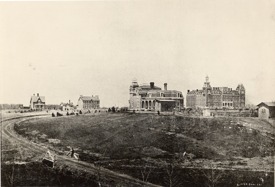Student Life at Iowa State: 1869–90
Douglas Biggs
Wednesday, 13 Mar 2019 at 7:00 pm – Sun Room, Memorial Union
Iowa Agricultural College, as Iowa State University was designated upon its establishment in 1858, began formally admitting students in 1869. Land-grant colleges and their ideals of making higher education accessible to all and providing instruction in liberal and practical subjects were still much more theory than tradition in 1869. Historian Douglas Biggs, a native of Ames and a graduate of Iowa State University, will discuss student life at Iowa State during it first two decades. He’ll share stories about the challenges students faced living in relative isolation, issues over the requirement for manual labor, and the fight over the colonizing of fraternities and sororities on campus.Douglas Biggs spent much of his youth exploring the ISU campus and later earned both a BA and an MA in history from the university before completing his PhD at the University of Minnesota. His interest in Ames and ISU history has led to several publications and public lectures on such topics as the Dinky, the university during World War II, and the early years of the Iowa State College football team. He is a professor of History at the University of Nebraska-Kearney.
Cosponsored By:
- Ames Historical Society
- Division of Student Affairs
- History
- Special Collections/University Archives
- University Library
- Committee on Lectures (funded by Student Government)
Stay for the entire event, including the brief question-and-answer session that follows the formal presentation. Most events run 75 minutes.
Sign-ins are after the event concludes. For lectures in the Memorial Union, go to the information desk in the Main Lounge. In other academic buildings, look for signage outside the auditorium.
Lecture Etiquette
- Stay for the entire lecture and the brief audience Q&A. If a student needs to leave early, he or she should sit near the back and exit discreetly.
- Do not bring food or uncovered drinks into the lecture.
- Check with Lectures staff before taking photographs or recording any portion of the event. There are often restrictions. Cell phones, tablets and laptops may be used to take notes or for class assignments.
- Keep questions or comments brief and concise to allow as many as possible.




